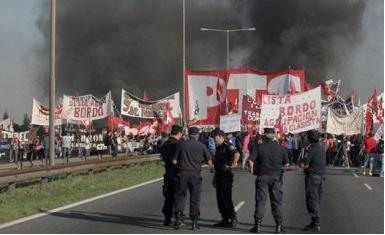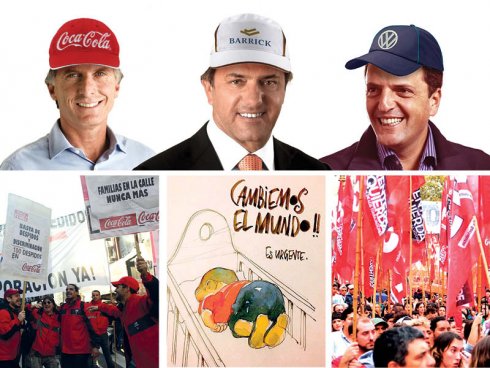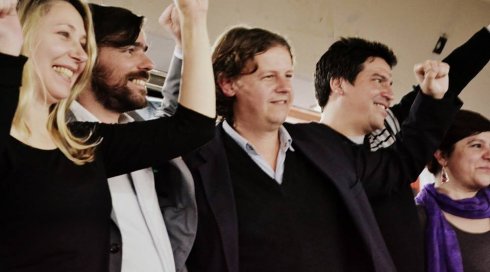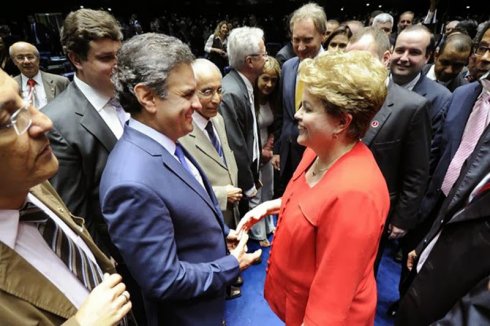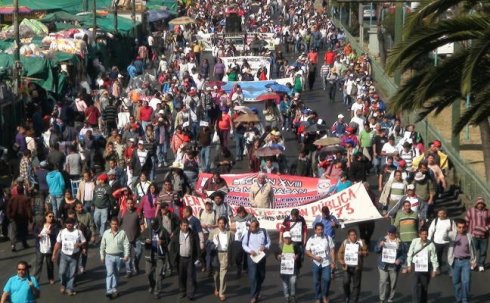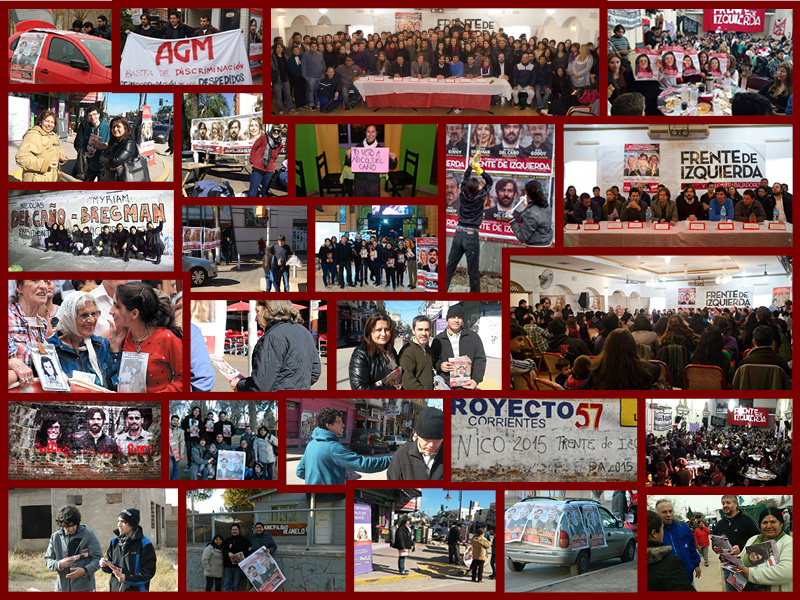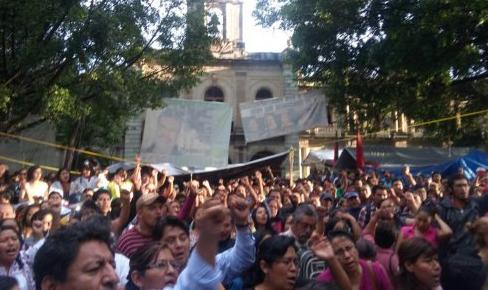Spain: Panrico and Coca Cola: A big step in the coordination of the struggles
25/04/2014
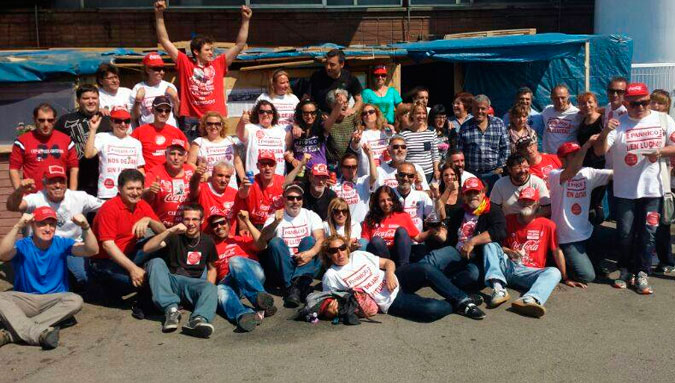
Spain: Panrico and Coca Cola: A big step in the coordination of the struggles
The working women and men of Panrico and Coca Cola are leading the biggest strikes in Spain. The war cry of Coca Cola Fuenlabrada is "Neither closures nor layoffs," a program of struggle linked to the "Zero layoffs, zero wage cuts" of the strikers at Panrico. If it is a matter of coordinating or socializing the the struggles, these courageous working men and women are trailblazers.
The historic Panrico strike has now been going on for six months. As the highest leadership body of the union, the Federal Council of the CCOO Catalonia, said, "It is impossible to control." It certainly became "uncontrollable" for management and the government of the Generalitat, but also for the ploys of the sell-out union leaders of the CCOO and UGT (http://www.clasecontraclase.org/Seis-meses-de-la-ingobernable-huelga-de-Panrico). These working women and men are showing a new morale of resistance, an abandonment of resignation and a firm willingness to fight.
Meanwhile, the Coca Cola strike, that began on January 31, has gone on for more than two months, against the closure of the Fuenlabrada plant and the layoffs. In the rest of Spain, more than a thousand workers have been put down for the ERE ("Record of Redundancy," a legal tool that facilitates dismissals) of the company, pressured by the big employers’ offensive, sick leave or almost no response of struggle from the national unions. However, the working women and men of Coca Cola Fuenlabrada are not giving in, despite the fact that 236 layoffs have already been carried out.
Panrico and Coca Cola, the struggle is the same!
These two strikes are beginning to find themselves reflected in several experiences in common, against similar enemies: the attacks of two very strong managements. In Panrico they are confronting a giant: a risk capital fund, the US Oaktree, property of the millionaire Howard S. Marks, who has amassed a fortune of 1.4 billion dollars, by speculation and buying bankrupt businesses. This plan is run by Carlos Gila, a specialist in restructurings, like Sintel and La Seda were. At Coca Cola, they are confronting the biggest food and agriculture group in Spain, run by Sol Daurella, who controls Coca Cola’s 7 bottling plants in Spain and Portugal, through Coca Cola Iberian Partners. Daurella’s personal fortune would exceed 850 million euros, including 150 million from an inheritance in a business based in Luxemburg. Her husband is a man close to the President of the government of Catalonia, Artur Mas, and her father was the first partner of Coca Cola in Spain since 1953. Since then, her family has been associated with the US company. (http://www.clasecontraclase.org/Coca-Cola-un-mundo-in-feliz-para-los-trabajadores)
But these managements are acting always supported by their respective governments, that did not hesitate to "collaborate" with big police operations to help in shutting down the factories, while their working women and men are camping on their picket lines. Nor do they do anything to defend the right to strike, that both managements are violating with the distribution of merchandise in Madrid and Catalonia, where neither Coca Cola nor Panrico products respectively are being manufactured.
And the division, at the national level, of the different factories, in which some are on strike and others, not, a result of open betrayal, as has occurred in Panrico, by the UGT and a group of the CCOO, or in the case of Coca Cola by the USO and the UGT in different plants, since the beginning has been a blow to divide the struggle and prevent a generalized response from the working women and men. Concrete coordination between Panrico and Coca Cola is a strong response of the workers in struggle against this division imposed from above.
The day in March: First experiences of coordination
The working women and men of Panrico and Coca Cola are fighting for jobs in a common struggle, in the streets and where it will be with the rest of the workers, the young people and the social movements. They have tried to jump the fences that divide the workers, by seeking coordination and a real exchange of experiences that will help each other to advance. One of their first experiences was the powerful day of common struggle on March 20, 21 and 22.
On March 20, the Panrico strikers were present at the National Hearing in Madrid, before the trial that was going to be held in opposition to the company’s ERE. The working women and men from Coca Cola of Fuenlabrada Madrid expressed their solidarity with them, welcoming them, along with other alternative and leftist unions. That day, the so anticipated trial was postponed until May 6, because of the non-appearance of one of the defendants, arguing "reasons of health," none other than a member of the CCOO of Valladolid, a signer of the agreement, who had not even been censured by the leadership of the union. But the working women and men of Panrico were not alone, and, together with the Coca Cola workers, they went up to the headquarters of the CCOO union to ask for explanations, supporting all their complaints. The same day, in the afternoon, the working women and men of Panrico were on the picket line of Fuenlabrada, where a meal was waiting for them, to fraternize and exchange experiences with the Coca Cola workers, and as part of the welcome of one of the March 22 marches of dignity, that entered through this locality.
On the following day, Friday, March 21, a moving meeting of working women of Panrico and Coca Cola took place, in which they spoke and exchanged experiences about how working women are living through and feeling the strike, the attacks by management. It was a very emotional event, with the presence of women workers from both enterprises, organized by the Madrid Committee of Support for the Struggles and Pan y Rosas (https://www.youtube.com/watch?v=rMDCbADLSTI). Both the women of Coca Cola and those of Panrico sought to highlight themselves in the strikes, with their own demands as women and as workers; they got mobilized in the demonstrations against the abortion law of the PP, and, on March 8, with slogans like "Working women, free and fighters," "We give birth, we work in production, we decide," and the now famous "Yes, we can! If one woman advances, no man loses ground!"
Finally, on March 22, in the Marches for Dignity, the strikers from Panrico and Coca Cola were part of a big workers’ entourage of coordination of the struggles. That day, almost a million and a half people filled the streets of the center of Madrid to the brim, with different retinues that represented struggles like that of those affected by mortgages, the surges against the policies of cutbacks in education and health care, those affected by preferential policies, the unemployed, the landless day laborers, women, young people, the immigrants. Also, different workers’ struggles: the miners, public health workers, cleaning workers, teachers, EMT workers, subway workers, firefighters, landscapers of Zaragoza in struggle. The leading banner of the demonstration was carried by representatives of some of these struggles, among them, that of the brave working women and men of Coca Cola and Panrico. The mobilization, together with the Extremadura Column from Carabanchel Alto, up to Colón, was the climax of three intense days of unity between these two great strikes, that began on March 20. This retinue kept agitating, during the entire demonstration, in favor of the unification of the struggles, the General Strike, and other slogans of unity between both struggles: "Don’t consume Panrico and Coca Cola," "Panrico and Coca Cola only understand one message: Boycott, Strike, and Sabotage," "Panrico and Coca Cola: the struggle is one," "Jobs are not to be sold out! They are to be defended!"
The great day of April 10
On this day, sunny Barcelona welcomed the workers of Coca Cola, along with the working women and men of Panrico, from the factory of Santa Perpetua de la Mogoda, to mobilize next to Esplugues de LLobregat, where the buildings of the two managements are located. It was a spirited morning of struggle, of "fraternity," as the workers themselves call it. After several hours singing, shouting, blocking the highway, the working women and men went to the factory of Coca Cola de Martorelles-Barcelona, to explain their situation in Madrid to each worker. Accompanied by the working women and men of Panrico, with a megaphone and pamphlets in hand, they spread their struggle and alerted about what could happen in other factories of Spain. Hunger was not long in coming, and so everyone went up to the Santa Perpètua "base camp," where another group of workers were waiting with a big meal, during which they could fraternize, exchange experiences and reflect together on the perspectives of their strikes. How to organize the Resistance Fund, how to carry out actions to boycott the products, the spreading of each struggle, advice against the different maneuvers of management, were some of the reflections. Anecdotes and plans for future actions together were not lacking, either.
That same day, the working women and men of Panrico had been summoned by the leadership of the CCOO confederation in their headquarters of Vía Laietana, in a members-only assembly, which not all the strikers could attend. It was another one of the maneuvers that, week by week, the union leaders bring, leaders that have been trying, unsuccessfully, to make the strike end, despite the layoffs. And this time, this type of maneuvers had the addition of an extremely harsh threat: suspending the May 6 trial if the workers did not accept a new agreement from the Generalitat that did not at all change the company’s initial plan. The working women and men, very firm, responded, ever more convinced and strong, determined not to accept these maneuvers. After a day of struggle beside the Coca Cola workers, more than one hundred workers approached Vía Laietana with a lot of morale and strength, gathering first in Sant Jaume Square: "Jobs are not to be sold out, but defended!" and "Panrico, by fighting, it will end up winning!" It was morale from the unity of the staff, from the strength of the assemblies, and from their own confidence, fortified with the strength of the Coca Cola workers after a great day of coordination.
Coordinate… socialize the struggles
The Coca Cola and Panrico strikers have always sought solidarity and coordination of all the groups in struggle, of young people, of the unemployed, of students. They re-established the Resistance Fund: a tool forgotten by the union leaders, key in order to maintain the strike. At Panrico, this has been possible thanks to those women who make handicrafts for the dozens of street markets and the "Vermouth" solidarity people, the groups that tirelessly went to other enterprises, to the universities. The Coca Cola workers are also starting their Resistance Fund; they are getting mobilized and showing solidarity with all the struggles, and they are participating in all the mobilizations that there are every day in Madrid, calling for boycott. And each demonstration, both of Barcelona and of Madrid, the strikers of both enterprises are shouting: Panrico and Coca Cola: the struggle is the same!
Solidarity crossed borders with the call for an "Internationalist Campaign" for Panrico, that received support from Mexico with the workers of the SME, from Brazil and the street sweepers on strike and from the subway, from Argentina, the workers of the militant unions and tens of groups in struggle, from the occupied factory Zanón, from France, from Germany, Bolivia, Chile. The Coca Cola workers are also receiving international solidarity, like that from the Coca Cola workers of Colombia and those of Argentina, where their factory committee is made up of militant workers.
Fuenlabrada Coca Cola calls for "socializing the struggles," and Panrico always sought coordination with other groups of workers in struggle. The common experience of both strikes and the search for coordination are a real school. Their attempt to overcome the barriers of division between the workers is an advance that establishes a precedent for future struggles to come. We militants from Clase contra Clase, together with the young women from Pan y Rosas, are betting that this coordination will spread and deepen, with the perspective that the working class will begin to respond strongly in opposition to the extremely harsh attacks of the government and the employers.
